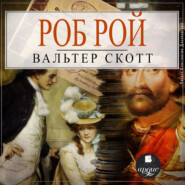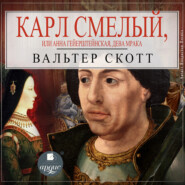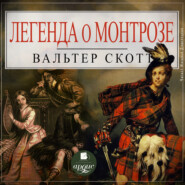По всем вопросам обращайтесь на: info@litportal.ru
(©) 2003-2024.
✖
The Heart of Mid-Lothian, Complete
Настройки чтения
Размер шрифта
Высота строк
Поля
They immediately applied to me to guide them to the next village and the best inn; and from the account I gave them of the Wallace Head, declared they were much better pleased to stop there than to go forward upon the terms of that impudent scoundrel the guard of the Somerset. All that they now wanted was a lad to carry their travelling bags, who was easily procured from an adjoining cottage; and they prepared to walk forward, when they found there was another passenger in the same deserted situation with themselves. This was the elderly and sickly-looking person, who had been precipitated into the river along with the two young lawyers. He, it seems, had been too modest to push his own plea against the coachman when he saw that of his betters rejected, and now remained behind with a look of timid anxiety, plainly intimating that he was deficient in those means of recommendation which are necessary passports to the hospitality of an inn.
I ventured to call the attention of the two dashing young blades, for such they seemed, to the desolate condition of their fellow-traveller. They took the hint with ready good-nature.
“O, true, Mr. Dunover,” said one of the youngsters, “you must not remain on the pave’ here; you must go and have some dinner with us—Halkit and I must have a post-chaise to go on, at all events, and we will set you down wherever suits you best.”
The poor man, for such his dress, as well as his diffidence, bespoke him, made the sort of acknowledging bow by which says a Scotsman, “It’s too much honour for the like of me;” and followed humbly behind his gay patrons, all three besprinkling the dusty road as they walked along with the moisture of their drenched garments, and exhibiting the singular and somewhat ridiculous appearance of three persons suffering from the opposite extreme of humidity, while the summer sun was at its height, and everything else around them had the expression of heat and drought. The ridicule did not escape the young gentlemen themselves, and they had made what might be received as one or two tolerable jests on the subject before they had advanced far on their peregrination.
“We cannot complain, like Cowley,” said one of them, “that Gideon’s fleece remains dry, while all around is moist; this is the reverse of the miracle.”
“We ought to be received with gratitude in this good town; we bring a supply of what they seem to need most,” said Halkit.
“And distribute it with unparalleled generosity,” replied his companion; “performing the part of three water-carts for the benefit of their dusty roads.”
“We come before them, too,” said Halkit, “in full professional force—counsel and agent”—
“And client,” said the young advocate, looking behind him; and then added, lowering his voice, “that looks as if he had kept such dangerous company too long.”
It was, indeed, too true, that the humble follower of the gay young men had the threadbare appearance of a worn-out litigant, and I could not but smile at the conceit, though anxious to conceal my mirth from the object of it.
When we arrived at the Wallace Inn, the elder of the Edinburgh gentlemen, and whom I understood to be a barrister, insisted that I should remain and take part of their dinner; and their inquiries and demands speedily put my landlord and his whole family in motion to produce the best cheer which the larder and cellar afforded, and proceed to cook it to the best advantage, a science in which our entertainers seemed to be admirably skilled. In other respects they were lively young men, in the hey-day of youth and good spirits, playing the part which is common to the higher classes of the law at Edinburgh, and which nearly resembles that of the young Templars in the days of Steele and Addison. An air of giddy gaiety mingled with the good sense, taste, and information which their conversation exhibited; and it seemed to be their object to unite the character of men of fashion and lovers of the polite arts. A fine gentleman, bred up in the thorough idleness and inanity of pursuit, which I understand is absolutely necessary to the character in perfection, might in all probability have traced a tinge of professional pedantry which marked the barrister in spite of his efforts, and something of active bustle in his companion, and would certainly have detected more than a fashionable mixture of information and animated interest in the language of both. But to me, who had no pretensions to be so critical, my companions seemed to form a very happy mixture of good-breeding and liberal information, with a disposition to lively rattle, pun, and jest, amusing to a grave man, because it is what he himself can least easily command.
The thin pale-faced man, whom their good-nature had brought into their society, looked out of place as well as out of spirits; sate on the edge of his seat, and kept the chair at two feet distance from the table; thus incommoding himself considerably in conveying the victuals to his mouth, as if by way of penance for partaking of them in the company of his superiors. A short time after dinner, declining all entreaty to partake of the wine, which circulated freely round, he informed himself of the hour when the chaise had been ordered to attend; and saying he would be in readiness, modestly withdrew from the apartment.
“Jack,” said the barrister to his companion, “I remember that poor fellow’s face; you spoke more truly than you were aware of; he really is one of my clients, poor man.”
“Poor man!” echoed Halkit—“I suppose you mean he is your one and only client?”
“That’s not my fault, Jack,” replied the other, whose name I discovered was Hardie. “You are to give me all your business, you know; and if you have none, the learned gentleman here knows nothing can come of nothing.”
“You seem to have brought something to nothing though, in the case of that honest man. He looks as if he were just about to honour with his residence the Heart of Mid-Lothian.”
“You are mistaken—he is just delivered from it.—Our friend here looks for an explanation. Pray, Mr. Pattieson, have you been in Edinburgh?”
I answered in the affirmative.
“Then you must have passed, occasionally at least, though probably not so faithfully as I am doomed to do, through a narrow intricate passage, leading out of the north-west corner of the Parliament Square, and passing by a high and antique building with turrets and iron grates,
Making good the saying odd,
‘Near the church and far from God’”—
Mr. Halkit broke in upon his learned counsel, to contribute his moiety to the riddle—“Having at the door the sign of the Red man”—
“And being on the whole,” resumed the counsellor interrupting his friend in his turn, “a sort of place where misfortune is happily confounded with guilt, where all who are in wish to get out”—
“And where none who have the good luck to be out, wish to get in,” added his companion.
“I conceive you, gentlemen,” replied I; “you mean the prison.”
“The prison,” added the young lawyer—“You have hit it—the very reverend Tolbooth itself; and let me tell you, you are obliged to us for describing it with so much modesty and brevity; for with whatever amplifications we might have chosen to decorate the subject, you lay entirely at our mercy, since the Fathers Conscript of our city have decreed that the venerable edifice itself shall not remain in existence to confirm or to confute its.”
“Then the Tolbooth of Edinburgh is called the Heart of Mid-Lothian?” said I.
“So termed and reputed, I assure you.”
“I think,” said I, with the bashful diffidence with which a man lets slip a pun in presence of his superiors, “the metropolitan county may, in that case, be said to have a sad heart.”
“Right as my glove, Mr. Pattieson,” added Mr. Hardie; “and a close heart, and a hard heart—Keep it up, Jack.”
“And a wicked heart, and a poor heart,” answered Halkit, doing his best.
“And yet it may be called in some sort a strong heart, and a high heart,” rejoined the advocate. “You see I can put you both out of heart.”
“I have played all my hearts,” said the younger gentleman.
“Then we’ll have another lead,” answered his companion.—“And as to the old and condemned Tolbooth, what pity the same honour cannot be done to it as has been done to many of its inmates. Why should not the Tolbooth have its ‘Last Speech, Confession, and Dying Words?’ The old stones would be just as conscious of the honour as many a poor devil who has dangled like a tassel at the west end of it, while the hawkers were shouting a confession the culprit had never heard of.”
“I am afraid,” said I, “if I might presume to give my opinion, it would be a tale of unvaried sorrow and guilt.”
“Not entirely, my friend,” said Hardie; “a prison is a world within itself, and has its own business, griefs, and joys, peculiar to its circle. Its inmates are sometimes short-lived, but so are soldiers on service; they are poor relatively to the world without, but there are degrees of wealth and poverty among them, and so some are relatively rich also. They cannot stir abroad, but neither can the garrison of a besieged fort, or the crew of a ship at sea; and they are not under a dispensation quite so desperate as either, for they may have as much food as they have money to buy, and are not obliged to work, whether they have food or not.”
“But what variety of incident,” said I (not without a secret view to my present task), “could possibly be derived from such a work as you are pleased to talk of?”
“Infinite,” replied the young advocate. “Whatever of guilt, crime, imposture, folly, unheard-of misfortunes, and unlooked-for change of fortune, can be found to chequer life, my Last Speech of the Tolbooth should illustrate with examples sufficient to gorge even the public’s all-devouring appetite for the wonderful and horrible. The inventor of fictitious narratives has to rack his brains for means to diversify his tale, and after all can hardly hit upon characters or incidents which have not been used again and again, until they are familiar to the eye of the reader, so that the development, enle’vement, the desperate wound of which the hero never dies, the burning fever from which the heroine is sure to recover, become a mere matter of course. I join with my honest friend Crabbe, and have an unlucky propensity to hope, when hope is lost, and to rely upon the cork-jacket, which carries the heroes of romance safe through all the billows of affliction.” He then declaimed the following passage, rather with too much than too little emphasis:—
Much have I feared, but am no more afraid,
When some chaste beauty by some wretch betrayed,
Is drawn away with such distracted speed,
That she anticipates a dreadful deed.
Not so do I—Let solid walls impound
The captive fair, and dig a moat around;
Let there be brazen locks and bars of steel,
And keepers cruel, such as never feel;
With not a single note the purse supply,
And when she begs, let men and maids deny;
Be windows there from which she dare not fall,
And help so distant, ‘tis in vain to call;
Still means of freedom will some Power devise,
And from the baffled ruffian snatch his prize.
“The end of uncertainty,” he concluded, “is the death of interest; and hence it happens that no one now reads novels.”
“Hear him, ye gods!” returned his companion. “I assure you, Mr. Pattieson, you will hardly visit this learned gentleman, but you are likely to find the new novel most in repute lying on his table,—snugly intrenched, however, beneath Stair’s Institutes, or an open volume of Morrison’s Decisions.”
“Do I deny it?” said the hopeful jurisconsult, “or wherefore should I, since it is well known these Delilahs seduce my wisers and my betters? May they not be found lurking amidst the multiplied memorials of our most distinguished counsel, and even peeping from under the cushion of a judge’s arm-chair? Our seniors at the bar, within the bar, and even on the bench, read novels; and, if not belied, some of them have written novels into the bargain. I only say, that I read from habit and from indolence, not from real interest; that, like ancient Pistol devouring his leek, I read and swear till I get to the end of the narrative. But not so in the real records of human vagaries—not so in the State Trials, or in the Books of Adjournal, where every now and then you read new pages of the human heart, and turns of fortune far beyond what the boldest novelist ever attempted to produce from the coinage of his brain.”
“And for such narratives,” I asked, “you suppose the History of the Prison of Edinburgh might afford appropriate materials?”
“In a degree unusually ample, my dear sir,” said Hardie—“Fill your glass, however, in the meanwhile. Was it not for many years the place in which the Scottish parliament met? Was it not James’s place of refuge, when the mob, inflamed by a seditious preacher, broke, forth, on him with the cries of ‘The sword of the Lord and of Gideon—bring forth the wicked Haman?’ Since that time how many hearts have throbbed within these walls, as the tolling of the neighbouring bell announced to them how fast the sands of their life were ebbing; how many must have sunk at the sound—how many were supported by stubborn pride and dogged resolution—how many by the consolations of religion? Have there not been some, who, looking back on the motives of their crimes, were scarce able to understand how they should have had such temptation as to seduce them from virtue; and have there not, perhaps, been others, who, sensible of their innocence, were divided between indignation at the undeserved doom which they were to undergo, consciousness that they had not deserved it, and racking anxiety to discover some way in which they might yet vindicate themselves? Do you suppose any of these deep, powerful, and agitating feelings, can be recorded and perused without exciting a corresponding depth of deep, powerful, and agitating interest?—Oh! do but wait till I publish the Causes Ce’le’bres of Caledonia, and you will find no want of a novel or a tragedy for some time to come. The true thing will triumph over the brightest inventions of the most ardent imagination. Magna est veritas, et praevalebit.”

















